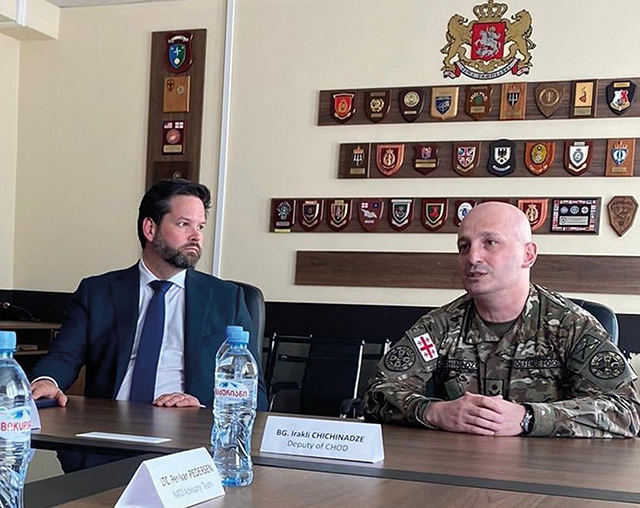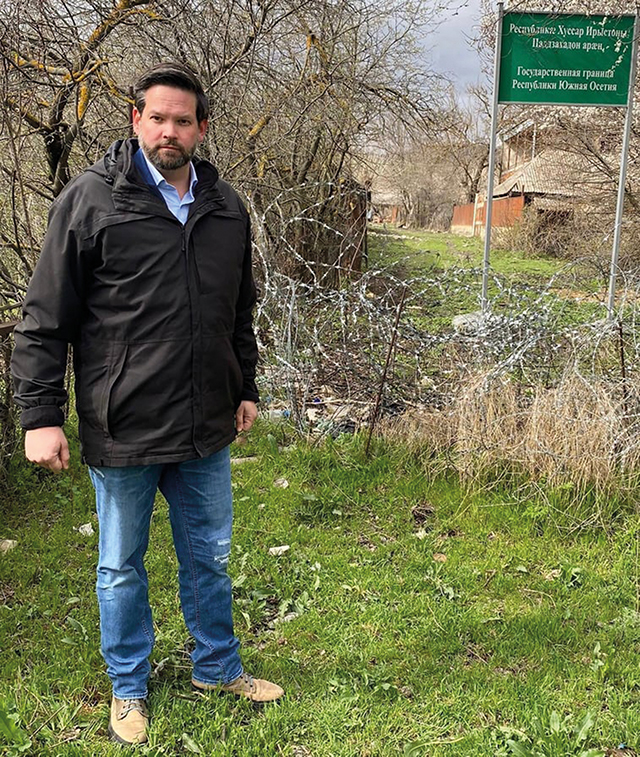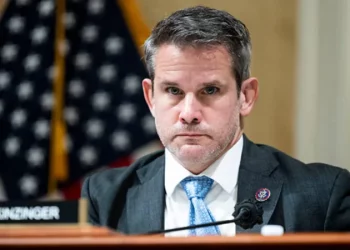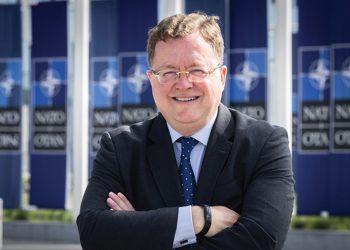The Kremlin’s war brought more unity [in the West] than anybody, even more than the head of the Kremlin himself, would have expected. If there is more aggression, there will be more sanctions. If the war goes on, the sanctions will be deepened – Lukas Mandl (Austria, EPP), MEP, who chaired the European Parliament’s Subcommittee on Defense and Security delegation’s visit to Georgia this week, told RFE / RL.
Before we discuss Georgia, let’s briefly deal with the Chancellor’s visit to Moscow. What’s your take on it? And what do you think was the aim, considering it wasn’t a friendly gesture?
Before his visit to Moscow, Chancellor Nehammer visited Bucha and Kyiv, and other parts of Ukraine, and there, as he stated himself, he felt the duty to confront the head of the Kremlin personally; to tell him what he had seen with his own eyes in Ukraine. In my opinion, it was also the case when Emanuel Macron talked to the head of the Kremlin several times to make sure that somebody confronted him with the truth.
Because the Kremlin is not only lying to the outside, most probably also the head of the Kremlin himself doesn’t receive true information. It’s important to confront him directly with the truth, with evidence about what’s going on [in Ukraine], and what the assessment of the free world is of these events.
Nehammer’s exact quote was – “he wanted to look into Putin’s eyes.” But that’s something we’ve heard quite a few times before, starting with US President Bush. Has it ever been productive?
For me, it’s clear that he fulfilled his moral duty, as he himself called it. It’s a positive thing that a high-ranking leader from the free world directly, personally confronts the head of the Kremlin regarding its aggression and war crimes. This is what the Chancellor did, and I greatly appreciate it.
I would like to underline that rule of law is a core promise of the European Union to its own citizens and to the world, it’s not some boring bureaucratic demand from Brussels
After the meeting, the biggest headline he brought out of that room was that Putin was determined “to solve” the Donbas issue, and that he was preparing for an assault. As Putin readies himself for that, is the West also prepared for such an escalation?
The Kremlin and its entire war machine should be aware that the free world is prepared in each and every respect to fight back – with historical sanctions as the first unbloody defense against the bloody attack. And the Ukrainians are ready to fight back militarily, to defend their land. The Kremlin’s war brought more unity [in the West] than anybody, and especially the head of the Kremlin himself, would have expected. If there is more aggression, there will be more sanctions. If the war goes on, sanctions will be deepened and broadened. And there are plenty of creative ideas and approaches to do so.

And yet, Austria, much like Germany, remains tied to Russian gas. German politician Florian Post recently said that while he condemned Russian aggression, he also “didn’t feel like freezing”. How much do you think this sentiment is shared in Austria? If the choice comes between getting a little bit cold and being tougher on Russia, what will Austria opt for?
The overwhelming sentiment today, not just in Austria, but in all of the free world, is that of unity. We must not let this unity weaken, due to this or that issue. This unity is unprecedented. This Unity will result in new sanctions, deepened sanctions. Even Switzerland, which is in neither NATO or the EU, has agreed to join the fifth sanction package. The objective of the Kremlin regime has always been to divide us – We did not let that happen; we have become even more united now due to this attempt to divide us. There is still a risk of division, though, and we must not let it happen. If one country can be weakened more than others due to certain sanctions, of course, unity means that we deliberate on those kinds of sanctions, but we must remain united in deepening, strengthening, and broadening sanctions.
On to your visit to Georgia then. What are your takeaways?
There were various points on the agenda for this parliamentary visit to Georgia. We met with the head of state, with the Prime Minister and with several ministers and other officials from the executive branch. But I would especially underline the importance of the meeting with the parliament members.
We count on the parliament to make reforms which put Georgia on the level of European standards in order to pave the way for European integration. This very week, the “EU questionnaire” was handed over to Georgia officially by the European Union. The impression I had from the Georgian side was that they never expected they would receive the questionnaire from the EU so early, and, yes, it happened very quickly.
Now, it’s very important that Georgia carries out its commitments towards the reforms, especially the judiciary reforms, with a particular focus on the rule of law. I would like to underline that rule of law is a core promise of the European Union to its own citizens and to the world; it’s not some boring bureaucratic demand from Brussels.

Second, of course, is that this war has changed the geopolitical scenery. It’s important to know each other’s positions, to stick together, to reflect together on the challenges these new, geopolitical shifts bring about, especially considering that Georgia has specific experience in this regard: as we all know, there are two areas, 20% of Georgian territory, occupied by Kremlin-backed forces.
And I must say I was highly impressed and highly appreciative of the fact that there are so many Ukrainian flags appearing on houses in Tbilisi’s streets. The population of Georgia is not only taking care of many refugees from the war in Ukraine, but also spending a lot of money and offering other kinds of support for Ukraine. So, there is obviously high empathy from the Georgians for the Ukrainians – of course, they know better than most what it feels like.
You’ve written extensively on the subject of Christianity in European politics. How much of a role do you think the faith and the Church, the fact that Georgia, Ukraine, Russia all share the same faith, plays in all of this?
I deeply believe that Christianity, the Christian faith, provides important principles which clearly define that human dignity, individual freedom, and free will are our inherent, fundamental values. Christianity is not the only source for these values, but one of many. The second point would be that one of the biggest achievements of enlightenment, of the free world as such, is the separation of state and the Church. It’s a free choice whether to believe or not, and not something to impose on people. This is part of human dignity. In modern civilization, it must be clear that the political sphere and the religious sphere are separated and remain separate. And here I have my doubts about Russia – there is obviously an alliance between the current leadership of the Moscow Orthodox Church and the Kremlin. And this is something called the political misuse of religion – it harms everything, individuals, societies, the Church and the state. Today’s Kremlin leadership is quite simply threatening humanity and its values, and that’s why we are all in this together. And what we defend is not this or that country, not this or that political affiliation, but humanity itself. We defend universal values like human dignity and individual freedom, that’s what is threatened today by the Kremlin.
Interview by Vazha Taveridze for RFE/RL













